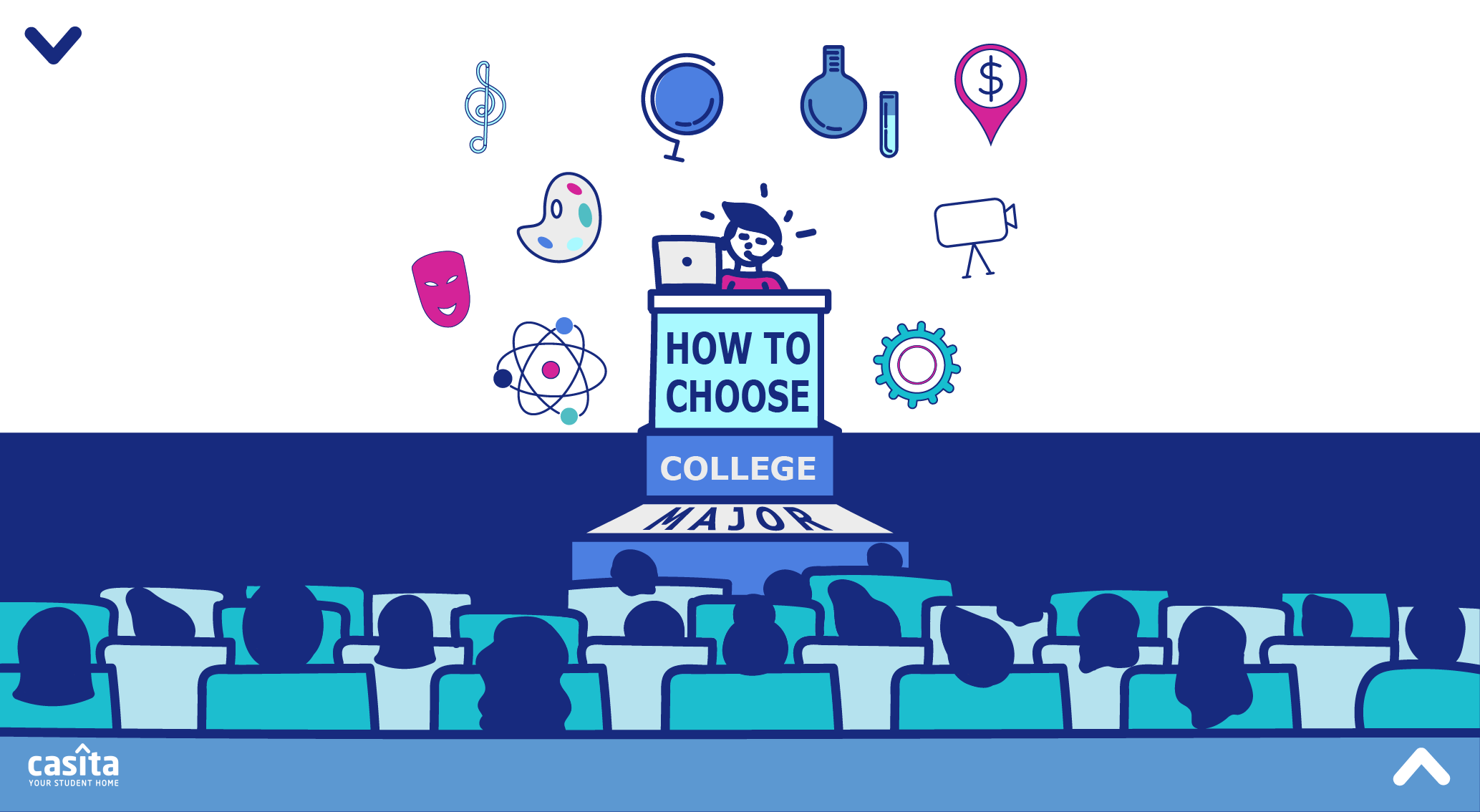How to Choose Your College Major?
Tips and Advice
University Life
6 mins read
Share

Updated at: 25 November, 2025
Published at: 10 May, 2021
By Samir Badawy
How to Choose Your College Major?
Tips and Advice
University Life
6 mins read

Updated at: 25 November, 2025
Published at: 10 May, 2021
By Samir Badawy
Share
Many of our students at Casita face the problem of doubting their college major choice. Big decisions, which include figuring out what to study, require time and thorough research. Always ask yourself, “What do I see myself doing in the future?” while evaluating your study options. If you’re wondering how to decide on a major and can’t choose one, we’ll walk you through the best steps to help you decide which major to study.
How to Decide on Your College Major?
To get a better idea concerning what to study as a college major, it is best first to look inwards and self-reflect. This self-reflection is done in various ways, which will be listed below. The mentioned steps are all important if you’re wondering how to decide your major and if you can’t choose your major.

Think about What You Like:
Thinking about what you like and your interests can help you choose your major when your likes and interests are aligned with the study of choice. You can start preparing a list of your interests, hobbies, and topics that may interest you. To better self-reflect, you can start by listing your strengths and weaknesses to see if these can align with or affect your potential study program. Before choosing your major in college, it is a good idea to start by finding your passion.
Reflect on past Academic Strengths:
Aligned with the first step, thinking about what you like is also through reflecting on your past academic strengths. In this step, you should look back at your previous academic performance while weighing the subjects you outperformed. If these subjects align with what you like doing, this helps you get a better understanding of your desired subject area.
Think About Your Future Goals:
It is always better to envision what you’ll like to do in the future, including what you see yourself doing from five to ten years after graduation. This reflection will help you decide what to major in and provide insight into a potential career path. It is never early to start planning ahead and start thinking about your future career goals.
Ask Yourself What Coursework Suits You Best:
Studying does not have to be boring; it can be exciting if it suits your preferences. This analysis is by asking yourself if specific subjects or topics are interesting or even types of coursework such as reading, researching, or even answering practical questions.
Choosing Your College Major Based on Research
Once you have gone through the previously mentioned steps and answered these questions mentioned earlier, then comes the research part. Researching will provide you with better insight into what the program offers, specialisations within the program, future career opportunities, and potential career salary information.
Start Researching the Field of Interest:
After evaluating your strengths and weaknesses, focusing on your current or past academic strengths, and thinking about your future career or goals, it is essential to collect more information on your desired college major. Start by browsing university programs that match your interests and read the program descriptions.
Program descriptions will provide more insight into what the program offers, specialisations in the program, and the expected coursework. It would be best if you also read more about topics related to your intended field of study to see whether the topics you read are exciting or not. It is essential also to start researching the potential costs of this program and the different degree options available to better plan ahead.
Research Your Future Career Opportunities in the Field:
It is necessary to not only look at the short term but also the long term, as your study, will largely determine your future career. With that said, it is always helpful to look at the potential career outcomes of this study program and the expected salaries from these potential future careers. Researching future career opportunities will help you make a more informed decision on which study program to choose.
Ask for a Second Opinion:
It is always an option to seek a second opinion through experienced professionals or advisors. Your school advisors or teacher can have a good insight into your academic capabilities and character as a student. Advisors, in particular, have more expertise in recommendations. Advisors, as trained experts, also know the set of questions to ask to assist you in finding the right major that suits you best, not to mention that they can also provide tips and mindmaps to better structure your thought process. Here are 20 questions to ask your counsellor that you can use if you don’t know where to start.
-min.jpg)
What to Do if Still in Doubt about Your College Major?
If you’re still in doubt about how to decide your major, don’t worry, there are many alternative options and ways around that. Thanks to changes in education, the possibilities are constantly expanding. Some options include tailoring your own program, choosing a double major, doing a minor, or even taking introductory courses. Other options include going on internships, taking a mini course to provide more insight into the field of study, visiting the college of your choice to get more information, volunteering, or even attending college as an undecided major.
Tailoring Your Course:
Many universities nowadays offer the option to design your own major with the help of advisors or professors. Many colleges have started offering this option, which provides an individual and specially tailored program that best suits your needs. These programs are usually interdisciplinary, drawing courses from different fields. One important thing to consider, however, is to keep these courses aligned with your future career goal plans.
Choose a Double Major Program:
If you still can’t choose your major but are in between two fields of interest, you can always choose a double major. Double majors allow you to study both areas of interest and widen your career option; make sure that both programs align with your future plans and do not overlap regarding the study requirements.
Go for a Minor Course:
Minor courses are specialisations that you can take next to your major; the closest description that matches a minor is a mini bachelor program with fewer credits. This Minor specialisation doesn’t have to be the same as what you are currently studying; for example, you can minor in a language while majoring in Business. Going for a minor program is another alternative option other than taking a double major and will add an extra edge to your resume as well as add more skills and expertise in another field.
Start Your Studies as an Undecided Major:
Not being able to choose a major is very common; this is why various institutions offer the option of starting your studies as an undecided major until you are able to declare your major. Studying as an undecided major allows you the opportunity to take various courses in many fields, which will enable you to take a more informed decision on what you want your major to be.
Consider Having an Internship or Volunteer Work:
Internships and volunteering opportunities can provide you with relevant work experience as well as provide you with more insight into what you would like to study. You can always take an internship or volunteer if you are still trying to decide what to study after school.
Attend College Visits and Events:
Attending college visits and events is very useful for learning more about the learning environment and also for asking any study-related questions. Attending college visits also provides you with a better insight into the study’s nature as you’ll get to talk with representatives and even college students to get a better understanding of the course’s nature as well as get your questions answered.
At Casita, we wish our students the best of luck in choosing their college major, as well as provide valuable tips and tricks on how to decide on a major program. We also offer various resources, such as how to stand out on your college application once you’ve decided on your major, as well as the highest-paying jobs in fields such as psychology and computer science.
Once you successfully choose your major and get your university offer, our accommodation experts will gladly assist you in finding the most convenient student accommodation. Through Casita, we make student housing easy by simplifying the booking process thanks to our experienced and multilingual accommodation experts. For more information on your student housing, check Casita or contact one of our accommodation experts.

FAQs
1. When do you choose your major at university
In most cases, you choose your major in university during your Sophomore year; however, it is recommended to start planning your major as soon as possible. Choosing your major also varies based on your institution; some students can already declare their major or even have an undecided one.
2. Why choosing a major is important
A major is a specific subject or study area a student decides to undertake as part of their future study journey. Choosing a major is essential as it also determines, at large, your career outcome post-graduation.
3. How to choose a college major when you’re stuck
It would be best to start reflecting inwards by seeing what you like, including hobbies and interests, and assessing your general and academic strengths. Ask yourself which coursework suits you best and what your future plans are. The next step consists of research, which includes researching your field of interest and reading about related topics.
You can also always rely on the opinion of an academic advisor experienced in these situations. If you’re still stuck, consider tailoring your course, going for a double major, or choosing a major and a minor. You can also get hands-on experience from an internship and volunteer work, or visit colleges to ask study and field-related questions. Also, get to know the pros and cons of taking a gap year.
Tips and Advice
University Life
By Samir Badawy
Share
Tips and Advice
University Life
Updated at:
Published at:
By Samir Badawy
Share


